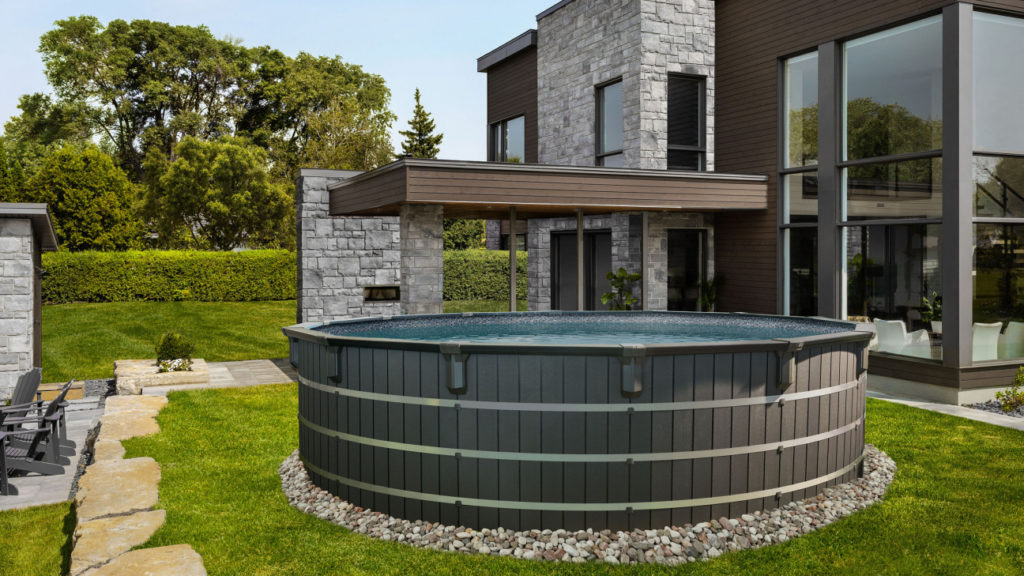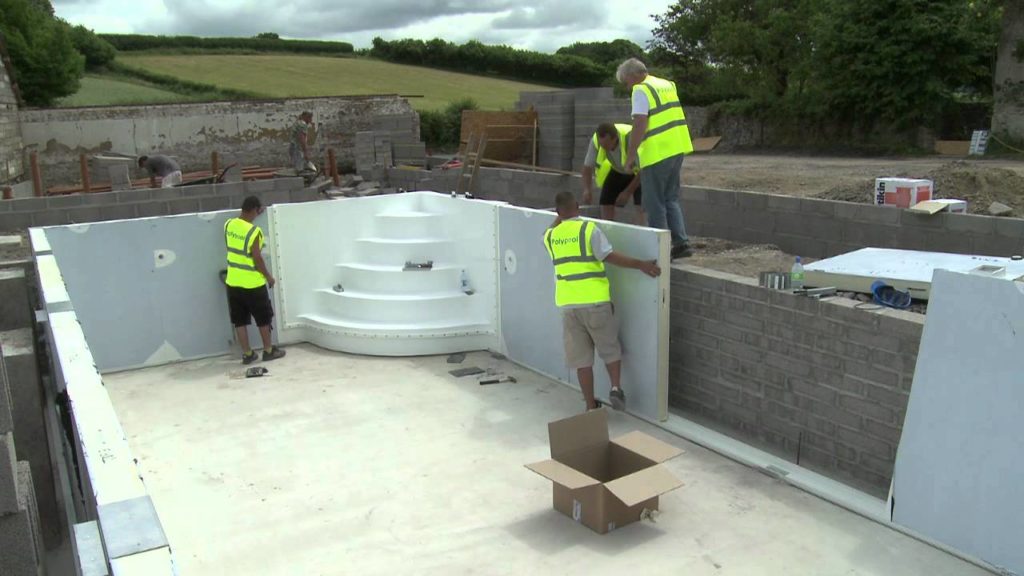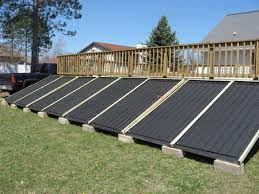Many people decide on either above-ground or in-ground swimming pools to help beat the heat and have fun outdoors. Each type has its benefits, and there’s a good reason to decide on either option. If you decide that you want to heat up your pool to try and extend your season more you’ll have some additional considerations to make, depending on the type of swimming pool that you have. These considerations become even more important if you decide that you want to heat your pool using a solar heating solution.
Your Heating Options
If you decide that you want to heat up your swimming pool throughout the year, you pretty much have three different options to help you complete your goal. The first option and likely the most affordable upfront is a gas-powered hot water heater. This solution burns gas to heat up your pool water as it’s pumped through the system and back down into the pool. The next option is an electric heat pump that extracts heat from the outside air and uses it to warm your pool water. The final option is a solar heating system that warms itself from direct sunlight and transfers that warmth to your pool water.
Each option works well, but the gasoline and electric heat pump will both cost you much more money over time than the solar heating solution will, because a solar solution generates all its heat passively from direct sunlight.

More Power for Above Ground Pools
The main difference between an above-ground pool and an in-ground pool is that the above-ground pool loses heat at a much greater rate than an in-ground pool does. That’s because heat is lost out the sides of the pool as well as the top. An in-ground pool loses heat out the top, but the sides are surrounded by insulating dirt. Although some heat is lost out the sides, it’s at a much slower rate than it is for an above-ground pool. What this means is that if you have an above-ground pool and an in-ground pool of the same size in the same climate, the above-ground pool requires a much more powerful heater to raise its temperature than an in-ground pool does.
The Systems are the Same–Sizing is Not
If you decide that you want a solar water heater for your swimming pool, the type of pool you have isn’t going to alter the type of heater that you need. Every solar heater will move the water from your pool through the collector array that heats it up and sends it back to the pool once again. The only change that has to be made is the size of the system. You’re going to need a larger system for your above-ground pool, and that means that you’ll need more space and you’ll spend more up-front in materials and labor to have everything installed.
Adding Insulation to Cut Costs
If you plan on heating your above-ground pool, it’s a good idea to consider insulating it first and foremost, especially if you are planning on making use of anything other than solar heating. While solar heating is free after all the installation and material costs upfront, gas or electric heaters will cost you on a continual basis. There are insulation products that can be installed underneath the waterproof liner of an above-ground swimming pool. This insulation helps to cushion the pool further, and it holds in that precious heat that’s being lost so readily from the pool. It’s an important step to consider to really improve the temperature of your pool throughout the year if it’s an above-ground model.

Consider Your Roof Space
Solar pool heaters work best when their collectors are installed on a roof. Not only is the sun access usually better, but the collectors are up out of the way and don’t take up precious yard space. Whether you have an above-ground or in-ground pool, it’s important to consider if you have enough roof space for your solar heating needs. You’re going to need to dedicate a large amount of space to heat either pool type, but with an above-ground pool, you’ll likely need around twice as much space for your heating array. This might mean that you have to rely on backup heat sources to get your pool to the desired temperature, or it might mean you have to rely on more efficient solar collectors to do the job.
Pool Solar Collectors
When you want to heat water for your swimming pool you have three different solar collector options available to you. There are flat plate collectors, evacuated tube collectors, and batch collectors. Flat plate collectors generally take up the most roof space of the bunch, but they generate a good amount of heat without the need for added water storage, as is the need of the other two options. Batch collectors hold a high amount of water that’s heated over time and put back into the pool, these collectors can heat water up to uncomfortably hot levels over time and they tend to be less efficient than the other two heating methods. Evacuated tube collectors are the most efficient option available. They rely on vacuum tubes to generate heat and can produce more heat in less rooftop space than flat plate collectors can offering added heat for pools with large heating needs.

Consider Solar Covers
Before you even decide to get a pool heater it makes more sense to put a solar cover over the top of your swimming pool if you aren’t using one. These covers are very effective at helping to hold the heat from sunlight in your pool to help raise the temperature. They work well with both in-ground and above-ground swimming pools and are a cheap addition that every pool owner should have if they’re trying to increase the swimming temperature of the pool. The covers can be easily removed and put on when depending on temperature needs. Generally, it’s a good idea to keep the cover over the pool anytime it isn’t being used, as long as you want the water to be at a higher temperature than what it is. Not only will the cover help increase the heat of the pool and help hold that heat in, but it will also reduce evaporation and help retain your water throughout the season to keep water bills or pressure on your well system down.
Adding a Backup Heat Source
Most solar heaters aren’t going to provide you with all the heat you need if you live in a cooler climate and you plan on using your pool all throughout the season. If that’s the case you’ll need to consider a backup heat source as well. There are two common types of pool heaters available as backup heaters. A heat pump and a gas-powered heater. The heat pump system relies on electricity and is more efficient than a gas-powered unit. A gas-powered unit is more affordable initially and will heat the water quickly, but will do so at a higher cost to you. If you will need the backup heat quite frequently a heat pump is the more affordable option, but if you only need occasional heat a few times during the season, the gas option is likely to be the more affordable way to go even when you factor in the long-term costs.
Whether you have an above-ground swimming pool or an in-ground pool you can heat your water to a comfortable temperature. You’ll just have to consider the size of your solar heating system carefully, and whether you want a backup gas or heat pump system to help you keep that pool open for longer.